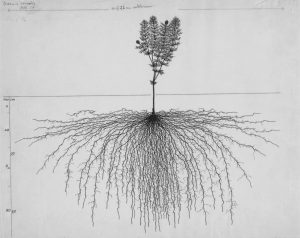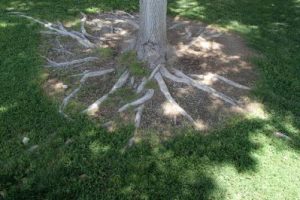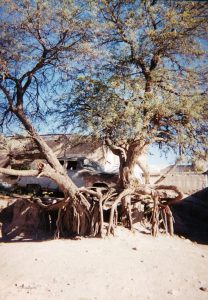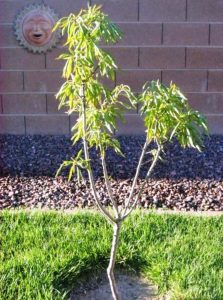Roots of plants do not grow separately. They
grow together, all mixed up. Roots search for open spaces that are wet. They use
the water for irrigated neighboring plants. Before now, we used to assess all
the different plants’ water use and then add them together. Collectively they
made up water needed by a landscape. But now, because we can’t separate the
roots, we estimate the water use of a total landscape, not each
individual plant and add them up.
Plant roots growing in the desert follow
water. Not entirely true because they’re looking for air as well. Air and water. A mixture. Ask any person growing in hydroponics. But water is their principal need. With rainfall it’s a lot easier. With
rainfall, spinning a circle with an established plant lying horizontally,
roughly describes where you can find its roots. In the desert it’s not that
easy. The first rule of plants growing in the desert is that roots will follow
water! Where water is applied, you will find the roots of plants.
 |
| The roots of plants are roughly proportional to the height and width of the top of the plant if they get plenty of rain and the soil drains. https://www.openculture.com/2022/01/1100-delicate-drawings-of-root-systems-reveals-the-hidden-world-of-plants.html |
Plant roots are lazy. They use first, water
that’s the easiest to get. The easier the water is to get at, the better. This
is why trees growing in lawns have a mass of shallow roots! It’s difficult to
get roots to grow deeper than “lawn water” but necessary. Shallow watering, as
in a lawn, produces trees and shrubs with shallow roots. Tree and shrub root
can grow deeper but they don’t have to. Trees and shrubs with roots deeper than
the lawn are necessary. Deeper roots tolerate summer heat better.
 |
| Trees growing in lawns have a mixture in the soil of lawn grass roots and tree roots. |
How to get deeper roots in Las Vegas?
First, remove the lawn during cooler weather, starting in early fall and later.
Use the weather app on your phone. September is usually okay but don’t remove lawns
during June, July and August which are typically our hottest months. Secondly,
move the irrigation emitters that are near the trunk. Soils are different but
drip emitters starting 12 to 18 inches from the trunk are close enough.
Emitters spaced 18 inches or more under at least half of the canopy is usually
enough. As these trees and shrubs get bigger, they will require extra emitters.
Space extra emitters the same as the others.
 |
| There is a river a couple hundred yards from this mesquite tree. Tree roots go after water only if the soil is wet nearby. |
Avoid watering daily. It’s not necessary
and it works against you. Every landscape is different, but there are normally only
three types of plants that require daily irrigation in the summer: lawns,
vegetables and annual flowers. Give trees and shrubs at least one
day of “rest” (without water) before watering again. Do you want your plants to
have shallow roots or deep roots?
